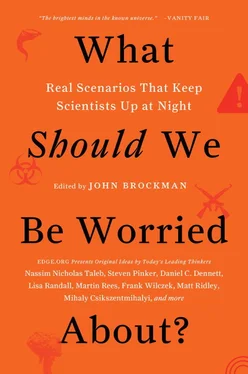(3) A sense of what the proximate danger is, which is often a by-product or side effect of what is talked about. “Global warming” was a bad description of a danger, because it sounded comfy, and even “climate change” sounds fairly neutral. Extreme weather conditions causing humanitarian disasters get more attention. Regional warfare for access to resources (oil) or arable land may be more salient than a few degrees of temperature change or rising ocean surfaces. It is entirely possible that global warming will lead to nuclear war as a side effect, but that’s not where our concern needs to be.
There is a need for research on the social psychology of fear and anxiety, which is undoubtedly going to be different from what we know about the individual psychology of fear and anxiety. For instance, it seems probable that a sense of chronic threat is a permanent element in some populations. What has replaced fear of the “red menace” in Americans, and how has this replacement affected attitudes to immigration or to the deficit? How essential is the state of constant threat to Israeli social solidarity? How consciously has the U.S. government manipulated the fear of terrorism in U.S. politics? How does the fear of “stranger danger” displace the fear of domestic violence? Arguably, humans may require a certain amount of worry to function effectively, whether this worry is fear of hell or fear of the neighbors. If this is the case, it might be safer to focus on worrying about the Red Sox winning the pennant.
ROGER SCHANK
Artificial intelligence theorist; cognitive scientist; CEO of SocraticArts; author, Teaching Minds: How Cognitive Science Can Save Our Schools
I am worried about stupid. It is all around us. When the Congress debates an issue, both sides appear to be wrong. Worse, our representatives can’t seem to make a reasoned argument. Candidate after candidate in the last election said things completely unsupportable by the evidence. Supporters of these candidates couldn’t usually explain in any coherent way what they were really in favor of.
Or consider experiences in customer service, where it is clear that the person with whom you are speaking is reading from a script and incapable of deviating from the script because they really don’t know what they’re talking about.
Our high school graduates are very good at test taking. Story after story comes out about how cheating occurs even in the best schools and even involves teachers. No one asks what students are capable of doing after they graduate, because no one cares. We just worry about what they’ve memorized. I worry about whether they can think. Talk to a recent graduate and see if they can.
I worry that young people don’t talk any more. LOL and OMG do not a conversation make. It is conversations that challenge beliefs, not emoticons.
I worry that since no one thinks they need to think, the news has become a mouthpiece for views that can be easily parroted by their listeners. Challenging beliefs is not part of the function of the news anymore.
I worry that we have stopped asking “Why?” and stopped having to provide answers. We say we need more math and science in school and don’t ask why. We say we need more soldiers and more arms and don’t ask why. We say a prescription drug works miracles, but we fail to ask about what we really know about what else it does.
We glorify stupid on TV shows, showing what dumb things people do, so that we can all laugh at them. We glorify people who can sing well but not those who can think well. We create TV show after TV show demonstrating that acting badly will make you rich and famous. The fact that most exchanges on these shows are done without thought and without the need to back up opinions with evidence seems to bother no one.
I worry that behind this glorification of stupidity and the refusal to think hard about real issues are big corporations who make a great deal of money on this. The people who sell prescription drugs don’t want people asking how the drug works or how the clinical trials went or what harm the drug might do. The people who debate spending cuts don’t want people asking why they never talk about cuts in defense or cuts in the gigantic sums we give to other countries. The people who run corporations that profit on education don’t want anyone to ask whether there aren’t already many unemployed science and math PhDs; they just want to make more tests and sell more test prep. The people who run universities don’t want anyone to ask whether a college education is really necessary for the majority of the population, or even well done at the majority of our colleges. The people who run news organizations have an agenda, and it isn’t creating good thinkers who understand what’s going on in the world.
So I’m worried that people can’t think, can’t reason from evidence, and don’t even know what would constitute evidence. People don’t know how to ask the right questions, much less answer them. And I’m worried that no one, with the exception of some very good teachers who are much unappreciated, is trying to teach anyone to think.
I’m worried that we will, as a society, continue to make decisions that are dumber and dumber, and that there will be no one around smart enough to recognize these bad decisions or able to do anything about them.
THE CULTURAL AND COGNITIVE CONSEQUENCES OF ELECTRONICS
LUCA DE BIASE
President, Fondazione Ahref; scientific director, Digital Accademia; visiting lecturer in new media & journalism, IULM University, Milan
Sixty years ago, the Italian poet Giuseppe Ungaretti wrote about the cultural future of electronics. As a young poet before World War I, Ungaretti had been briefly fascinated by the Futurist movement, and he had strong feelings about the “poetic” rhythm of mechanics and the aesthetics in the technical discoveries. But after World War II, at the age of sixty-five, he was worried. In the past, he wrote, technology followed human imagination, but in the future the enormous set of engineering achievements, led by electronics, was going to go faster than human imagination; thus humanity could end up thinking as machines, losing the ability to feel, love, fear.
Lately, many scholars have been giving more than a thought to these matters. It has been a generative debate, touching on everything from the way search engines change our memorization strategies to the persuasive effects of interface design and even to the way some open platforms enhance our tendency to cooperate instead of compete. But after all that thinking, we are paradoxically both bored and worried. Innovation in digital technologies moves at such a fast pace that we still need more research about the cultural and cognitive consequences of electronics. For this research to succeed, it must be focused on long-term changes, which means defining the problem in a more holistic and less deterministic way, as Ungaretti suggested.
How can we think about the way we think, without letting our minds be trapped in the means we use to communicate? The mediasphere is a sort of environment, in which most information and knowledge live and develop. And the “information ecosystem” is a generative metaphor to make sense of such a media environment. This metaphor helps mediologists understand the coevolution of ideas and platforms. It works if one wants to stress the importance of diversity in the mediasphere. And it leads to approaching the media as a complex system.
But as the information-ecosystem metaphor grows more popular, it also generates a set of inconvenient analogies. Thus we start to look for an “ecology of information,” and we worry about long-term tendencies. This leads us to define specific problems about the risks of monocultures, the possible development of info-polluting agents, the existence of unsustainable media practices. This approach can be useful if we don’t let ourselves misinterpret the metaphor. Science, economics, politics, entertainment, and even social relations grow in the mediasphere. And ideologies, misinformation, and superstition also develop in the information ecosystem. We cannot think of info-pollution in terms of “bad content,” because nobody can define it as such, just as nobody can define as “bad” any life-form in an ecosystem. Info-pollution is not about the content; it is more about the process. It is about the preservation of a cultural equilibrium.
Читать дальше












